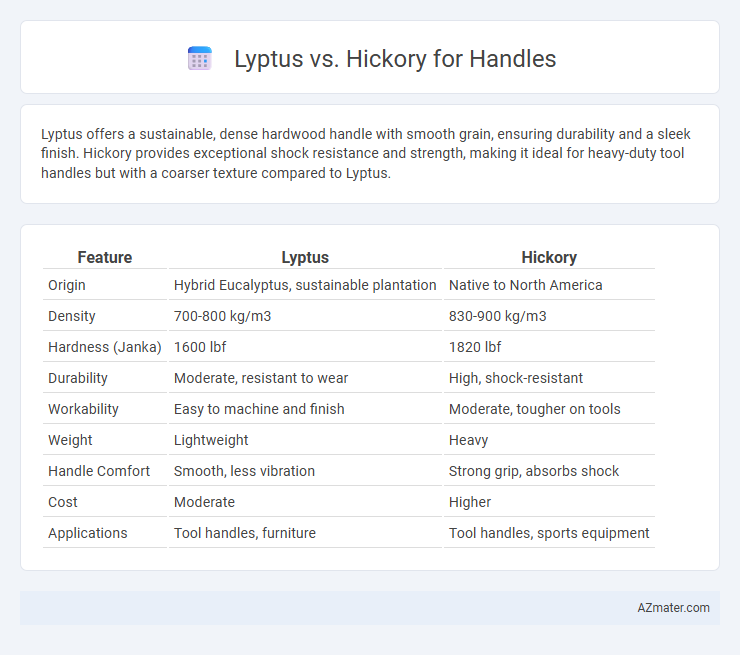Lyptus offers a sustainable, dense hardwood handle with smooth grain, ensuring durability and a sleek finish. Hickory provides exceptional shock resistance and strength, making it ideal for heavy-duty tool handles but with a coarser texture compared to Lyptus.
Table of Comparison
| Feature | Lyptus | Hickory |
|---|---|---|
| Origin | Hybrid Eucalyptus, sustainable plantation | Native to North America |
| Density | 700-800 kg/m3 | 830-900 kg/m3 |
| Hardness (Janka) | 1600 lbf | 1820 lbf |
| Durability | Moderate, resistant to wear | High, shock-resistant |
| Workability | Easy to machine and finish | Moderate, tougher on tools |
| Weight | Lightweight | Heavy |
| Handle Comfort | Smooth, less vibration | Strong grip, absorbs shock |
| Cost | Moderate | Higher |
| Applications | Tool handles, furniture | Tool handles, sports equipment |
Overview: Lyptus vs Hickory for Handle Selection
Lyptus and hickory both serve as durable options for handle selection, with lyptus offering a lightweight yet strong composition known for smooth grain and resistance to wear. Hickory, valued for its exceptional hardness and shock resistance, provides a sturdy grip, making it ideal for heavy-duty tool handles subject to impact stress. Choosing between lyptus and hickory hinges on the desired balance between weight, strength, and aesthetic preference in handle applications.
Botanical and Origin Differences
Lyptus, derived from a hybrid of Eucalyptus grandis and Eucalyptus urophylla, originates primarily in Brazilian plantations known for sustainable forestry practices. Hickory consists of several species in the genus Carya, native to North America, typically harvested from hardwood forests spanning the eastern United States and southeastern Canada. The botanical distinction between Lyptus' fast-growing eucalyptus lineage and Hickory's dense, slower-growing nut tree species impacts their grain structure and workability in handle manufacturing.
Physical Properties and Hardness Comparison
Lyptus wood offers a uniform texture with a Janka hardness rating of approximately 1700, making it moderately hard and resistant to wear for handles. Hickory, known for its exceptional density and toughness, attains a Janka hardness of around 1820, surpassing Lyptus in impact resistance and durability. Both woods provide strong, durable options, but Hickory's higher hardness makes it superior for handles subjected to heavy use and stress.
Durability and Longevity
Lyptus offers exceptional durability with its dense, hard structure, making it resistant to dents, scratches, and wear over time. Hickory stands out for its superior shock resistance and toughness, often preferred for handles that endure heavy impact and repetitive use. Both woods provide long-lasting performance, but Hickory typically surpasses Lyptus in terms of overall longevity under intensive conditions.
Workability and Tool Compatibility
Lyptus offers superior workability for handles due to its fine, uniform grain and consistent density, enabling smooth shaping and reduced splintering compared to Hickory. Hickory, known for its exceptional toughness and shock resistance, demands sharper tools and more frequent sharpening to maintain performance during intricate handle work. Tool compatibility favors Lyptus as it responds well to various cutting and sanding tools, while Hickory's hardness can accelerate tool wear, requiring carbide-tipped blades or higher-grade tools for optimal results.
Aesthetics: Grain Patterns and Color
Lyptus features a fine, uniform grain with a smooth texture, presenting a reddish-brown hue that deepens with age, offering a modern and consistent appearance for handles. Hickory displays a striking, pronounced grain pattern with contrasting light and dark streaks, ranging from creamy white to rich reddish-brown tones, providing a bold and rustic aesthetic. The choice between Lyptus and Hickory hinges on whether one prefers Lyptus's sleek, even coloration or Hickory's dynamic, variegated grain and distinctive color variations.
Weight and Balance Considerations
Lyptus handles offer a lightweight yet sturdy option, enhancing maneuverability and reducing user fatigue during extended use. Hickory handles are typically heavier, providing excellent balance and shock absorption that improves control and comfort for precision tasks. The choice between Lyptus and Hickory ultimately depends on whether preference leans toward a lighter tool with quick responsiveness or a heavier handle with superior stability and durability.
Environmental Impact and Sustainability
Lyptus wood, derived from fast-growing Eucalyptus trees, offers a highly renewable source for handles due to its rapid growth cycle and plantation-based harvesting. Hickory, while durable and strong, often comes from older hardwood forests, leading to slower replenishment and higher environmental impact. Choosing Lyptus supports sustainable forestry practices with lower carbon footprints and reduced deforestation concerns compared to traditional hickory wood.
Cost and Availability
Lyptus offers a cost-effective alternative to Hickory with prices generally lower due to its fast-growing eucalyptus origins, making it more budget-friendly for handle production. Hickory, known for its exceptional strength and shock resistance, tends to be pricier as a result of its slower growth and limited geographic availability primarily in North America. Availability of Lyptus is more consistent and widespread, especially in regions where sustainable forestry practices are emphasized, whereas Hickory supply is subject to seasonal and regional variability impacting cost and procurement.
Best Applications for Lyptus and Hickory Handles
Lyptus handles excel in applications requiring lightweight durability and smooth finishes, making them ideal for kitchen tools, furniture, and decorative items. Hickory handles are preferred for heavy-duty uses such as tool grips, sporting goods, and axe or hammer handles due to their exceptional toughness and shock resistance. Both woods offer strength and resilience, but Lyptus suits precision and aesthetic focus, while Hickory dominates in impact and wear-intensive environments.

Infographic: Lyptus vs Hickory for Handle
 azmater.com
azmater.com